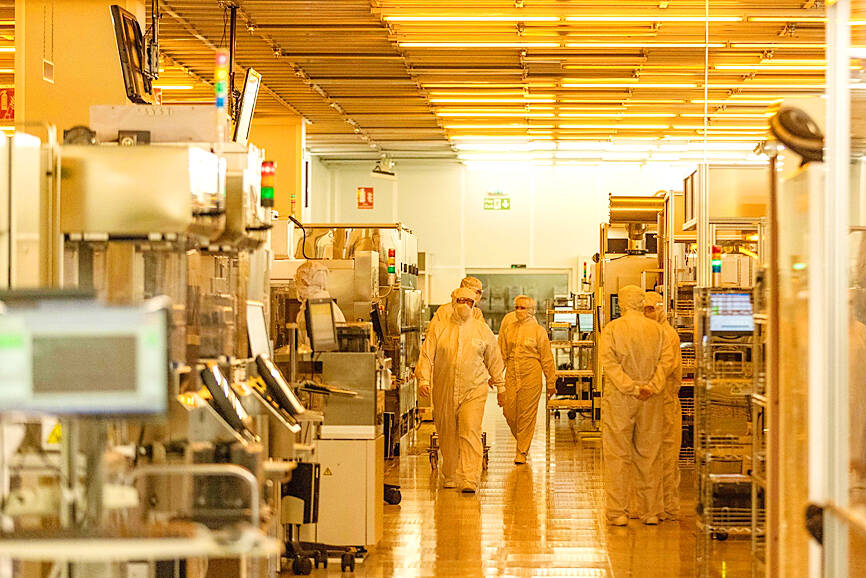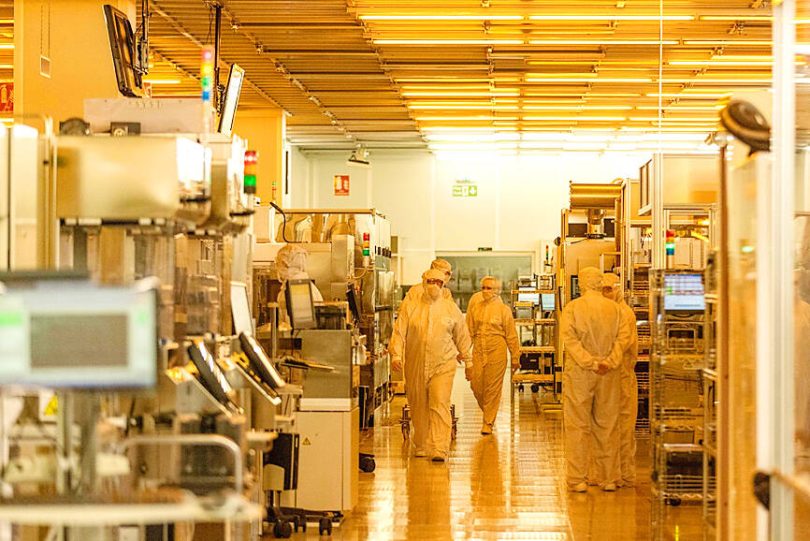[ad_1]
’SIGNIFICANT RISK’:
As the UK does not produce its own advanced chips, it should focus on developing ties with Taiwanese and US supply chains, UK lawmakers said
The UK is missing out on a wave of investment and falling behind other countries in the fast-growing semiconductor industry because of a lack of support from the government, British lawmakers said.
The UK government should urgently publish a long-delayed semiconductor strategy, and also look to create partnerships with allies to try to ensure the country remains part of the semiconductor supply chain, a report published yesterday by the UK’s Business, Energy and Industrial Strategy Committee said.
Manufacturers used more than a trillion chips last year to power devices ranging from vacuum cleaners to automobiles to advanced artificial intelligence computers.

Photo: Bloomberg
The need for advanced semiconductors is expected to grow, and shortages of semiconductors since the start of the COVID-19 pandemic have exposed the vulnerabilities of economies if supply is shut off.
However, the UK industry is heavily reliant on companies in other countries, with little prospect of a turnaround unless the government improves support, the lawmakers said.
They said the government should consider supporting the creation of new semiconductor factories.
“It is not clear to us that the support currently offered by government is at anything like the scale which is needed to make a real difference, or in line with a clear strategy from ministers,” the report said.
The government initially said it would publish a semiconductor strategy in “autumn 2022,” but has so far declined to say when this would occur.
“The government is putting UK PLC at significant risk by failing to take action in support of the semiconductor industry,” Labour Party Member of Parliament Darren Jones said.
“Other countries are investing in the resilience of their semiconductor supply chains, yet ministers in the UK can’t even publish their semiconductor strategy on time,” said Jones, who is also the chair of the committee.
It comes after the government this month told the owner of the UK’s largest semiconductor factory that it must sell it to protect national security.
Nexperia Holding NV, a Dutch company owned by the Chinese conglomerate Wingtech Technology Co (聞泰科技), is planning a last-ditch appeal to try to overturn the decision.
The decision to intervene was welcomed by some observers, who argued that letting the takeover remain in place could leave the UK vulnerable to Chinese government interference.
However, the company’s staff association and management have expressed shock, outrage and fears for their jobs.
Nexperia said it welcomed the lawmakers’ commitment to consider the circumstances around the government’s intervention, although this would not take place until well after any appeal by the company is decided.
“We fully intend to appeal the government’s decision and, in the interim, remain focused on supporting our 600 staff in Newport [in south Wales] at this time, most of whom have worked at the site for many years,” a Nexperia spokesperson said, adding that “much more needs to be done to attract sufficient levels of private finance to this very capital-intensive industry.”
The most advanced computer chips have only 3-nanometers between the individual transistors that make up computer devices. Supply of those chips is dominated by Taiwan Semiconductor Manufacturing Co (台積電) and South Korea’s Samsung Electronics Co, but China, the US and the EU are racing to build up their own advanced chip industries.
The UK is not a large global player in the semiconductor industry. It has no ability to produce advanced chips, so the report said that the UK should focus on securing partnerships with allies such as the US and Taiwan to secure inward investments to be part of their supply chains.
Simon Thomas, the chief executive of Paragraf, a company hoping to use graphene in semiconductors, gave evidence of the US aggressively courting the company to encourage it to relocate, with no equivalent effort by UK authorities.
He said the government should publish a strategy and implement it as soon as possible.
“At the moment, it is all talk and no action as regards semiconductors, but now is the time for action,” Thomas said.
“We are committed to supporting the UK’s vitally important semiconductor industry,” a government spokesperson said.
“We are reviewing our domestic capabilities and working closely with industry and international partners to develop a new semiconductor strategy which will grow the sector further and make sure our supply chains remain resilient,” the spokesperson said.
Comments will be moderated. Keep comments relevant to the article. Remarks containing abusive and obscene language, personal attacks of any kind or promotion will be removed and the user banned. Final decision will be at the discretion of the Taipei Times.
[ad_2]
Source link








